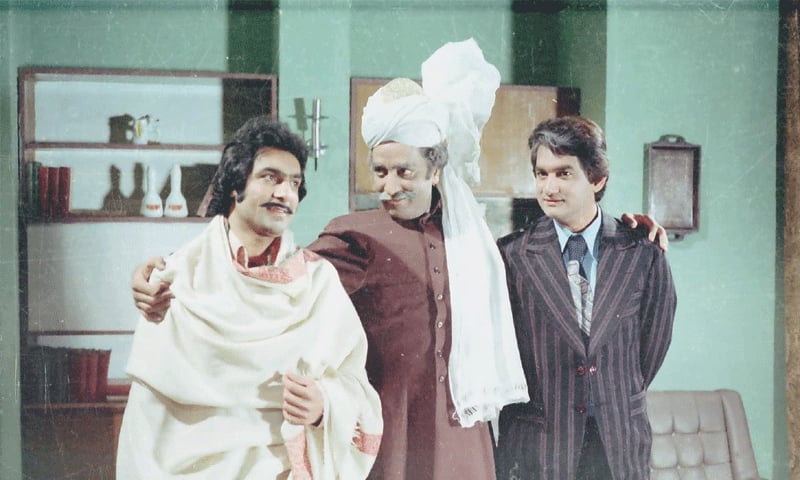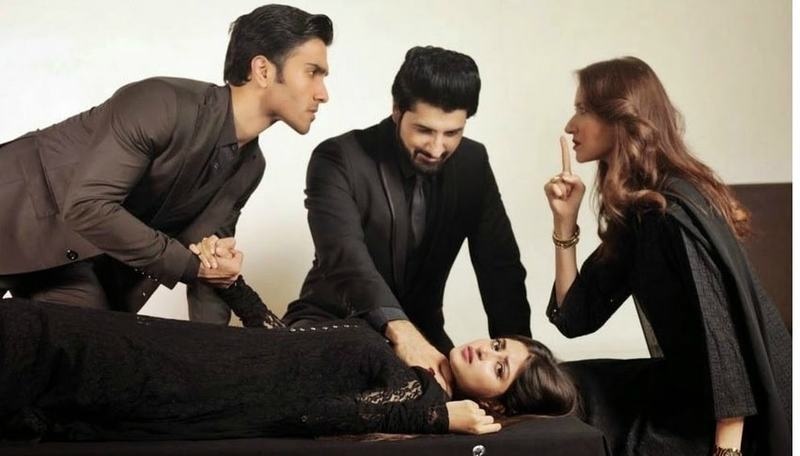Dumbing down society
Published in Nov-Dec 2014
(The article was first published in Nov-Dec 2014 edition of Aurora.)
Once upon a time, watching Pakistani television meant at best four to five hours of programming a day, including two news bulletins, azaan breaks and a hadith telop. Apart from that, entertainment covered an English comedy programme, English cartoons, a late night English drama serial and an Urdu drama serial, comedy programme or variety show.
The comedy was sharp and witty, often a satirical review of life as we knew it. Shows like 50-50 and Studio Dhai written by Anwar Maqsood. Surprisingly, Zia’s regime did not kill the satire pioneered by Shoaib Hashmi in the 70s. Anyone remember the reruns of Taal Matol? Regressive Islamisation and a clampdown on speech simply made the writers and actors smarter. Perhaps Zia and his cohorts had a funny bone underneath their starched sherwanis? Or they decided to turn a blind eye.

“Daikhti aankhoun aur suntay kaanon, aapko Tariq Aziz ka salaam” heralded the start of the one and only variety show, called Neelam Ghar. It was a mix of entertainment segments, quizzes and game show elements. It also gave birth to that time honoured line thrown at someone who comes up with a smart answer or a clever solution – “Aur water cooler aap ka hua”. Tariq Aziz’s solemnity was a far cry from the more flamboyant Zia Mohyeddin in the 70s. But Neelam Ghar was still firmly entrenched in the realm of intelligent television.
Then there were the dramas. Waris, written by Amjad Islam Amjad, was a riveting saga of feuding feudals. There was a twist in every episode, vicious intrigues and on some level it was startlingly real. Haseena Moin’s feisty and independent heroines (often clad in smart Tee Jays outfits without a dupatta in sight) went on to carve their own paths in life by embarking on ambitious careers and choosing their own mates. Fatima Surraya Bajia on the other hand played it safe with stories of large families, cousins marrying cousins, most of her more famous 80s dramas were adaptations of A.R Khatoon’s novels, set in the 40s and 50s.

Switch on the television today and you understand why it’s called the idiot box. Twenty-four hours of programming and most of it awful. Comedy is woefully absent. Apart from 4 Man Show and Banana News Network, wit and satire appear to have died a painful death. Compared to the shows of three or four decades ago, Hum Sab Umeed Say Hain (HSUSH) is weak and banks on cheap shots. If you are lucky you will catch a mildly amusing moment but it will not be half as memorable as the skits on 50-50 or Taal Matol. You are not going to find reruns of HSUSH on TV or the DVDs in shops anytime soon. Nobody relates the story of an old show over dinner with friends dissolving in laughter.
Forgettable, disposable television.
Instead of the erudite Zia Mohyeddin in his brocade jackets or the sombre Tariq Aziz in his awami suit, we are blessed by Aamir Liaquat, his manic, beaming visage and base sense of humour. Instead of Amjad Islam Amjad, an MA in Urdu literature, poet and college lecturer or Haseena Moin, an MA in History, pioneer of Radio Pakistan and school principal, we have a host of bitter and tired housewives or spinsters spinning tales of worn out, brow-beaten heroines submitting happily to the choke-hold of conservative society.

The Turkish dramas arrived two years ago and sent everyone into a tailspin. Writers, directors and actors were up in arms. Op-eds were written about how the Turks were ‘damaging’ our culture. In truth, the only thing they damaged was the complacency our writers were basking in. The Turkish dramas had intelligent and strong women as protagonists, women who were not afraid to challenge the status quo and carve out their own paths. Archaic conventions were set aside and a modern outlook was encouraged.
Whereas the Pakistani drama, Roag, showed a girl who had been sexually abused as a child and who then marries her abuser due to a cruel twist of fate, the Turkish drama Fatma Gul depicted a young victim of rape who succeeds against all odds to get her rapists imprisoned, falls in love, marries and has a family of her own. You would think the success of the more progressive Turkish drama would have given our local producers some food for thought. But no. They have persisted in doling out the same trash.

If the programming was just bad it wouldn’t be a cause for concern. What is troubling is the persistence with which regressive storylines are pursued with such fervour. Why are we catering to the lowest common denominator, where base humour and submissive women are the order of the day?
We have certainly come a long way from the days of Tanhaiyaan’s Zara who started her own business, wore saris with aplomb and had a romantic relationship based on friendship and equality. Now instead, working women are derided and deemed home breakers. Chiffon saris are worn by villainous tramps. Heroes who enjoyed playful banter with their better halves have been replaced by men who hark back to 19th century norms. The more a woman suffers the more virtuous she is deemed.

Isn’t it ironic that democracy and freedom of speech have led to regressive values and a stifling of the imagination? Isn’t it ironic that the greatest enemy of female empowerment are women themselves?
The writers who resent independent women for what they never had! The actresses who embrace these roles with aplomb for a fat pay cheque despite the fact that the lives they depict are light years away from the lives they lead? Or producers and channel heads who display such gross irresponsibility in perpetuating these myths?
Channel heads will turn around and say that this is what the public demands. No. This is not what the public demands and neither is it true that they do not accept sophisticated storylines. This is the public who laps up Turkish dramas, who loves song and dance advertisements and embraced the film Waar. This is the public who wears western influenced fashion and wants to eat home-cooked pasta and Chinese food. Television audiences are like babies, they get used to the food you give them. Try serving up fare that is a little more sophisticated and intelligent and they will like that too, over time. The dumbing down of Pakistan is not just a question of bad entertainment. It’s a question of society becoming more conservative and suffocating. Change this and you might find an overall more wholesome outlook to life. Where women do not hesitate to educate themselves and become more outspoken. Where men seek equal partners and not glorified maids. Where societal ills are discussed and dealt with.
S. Hyder works at an advertising agency in Pakistan.




Comments (12) Closed